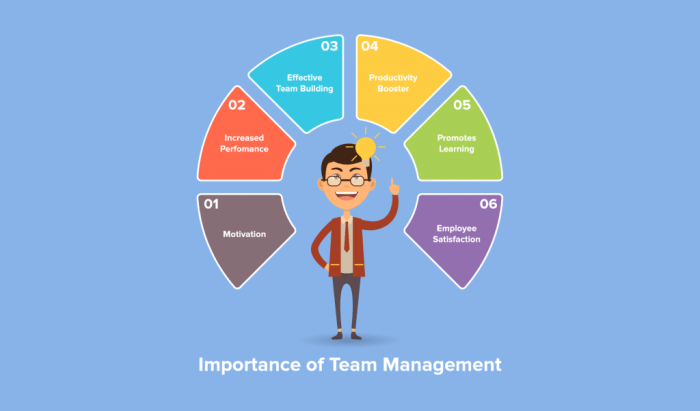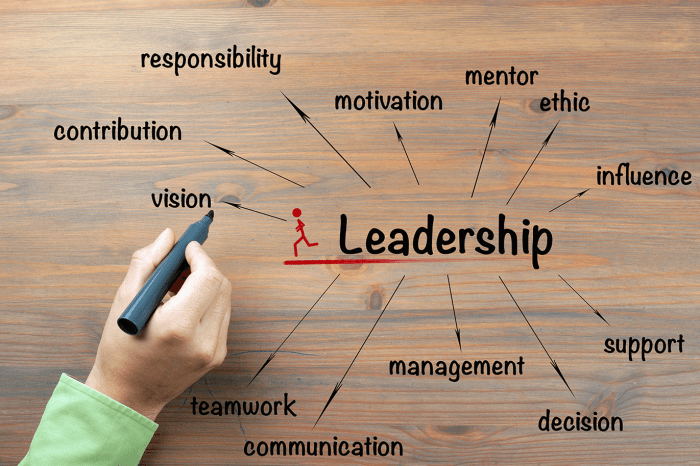Team Management Skills are essential in today’s work environment, shaping the success of teams and leaders alike. Dive into the intricacies of effective team management with us.
From understanding the core elements to navigating challenges, we explore how honing these skills can elevate team performance and collaboration.
Importance of Team Management Skills

Team management skills are crucial in a work environment because they help ensure smooth collaboration, effective communication, and overall productivity among team members. A leader with strong team management skills can inspire and motivate team members, delegate tasks efficiently, and resolve conflicts effectively.
Impact on Overall Team Performance
- Improved Communication: Effective team management fosters open communication channels, leading to better understanding and coordination among team members.
- Enhanced Productivity: When a team is well-managed, tasks are delegated according to individual strengths, resulting in optimized performance and timely completion of projects.
- Increased Morale: A leader with strong team management skills can create a positive work environment, boosting team morale and motivation.
Benefits of Developing Strong Team Management Skills
- Leadership Growth: Developing team management skills can help leaders enhance their leadership abilities, leading to career advancement and personal growth.
- Team Member Satisfaction: Team members benefit from strong team management skills as they feel supported, valued, and empowered to contribute their best to the team.
- Conflict Resolution: Strong team management skills enable leaders to address conflicts promptly and effectively, maintaining a harmonious team dynamic.
Core Elements of Effective Team Management

Effective team management involves several key components that are essential for the success of a team. One of the most crucial elements is communication, which plays a vital role in ensuring that team members are on the same page and working towards a common goal. Additionally, fostering collaboration within a team through effective management strategies is essential for maximizing productivity and achieving desired outcomes.
Role of Communication in Team Management
Effective communication is the cornerstone of successful team management. Clear and open communication helps in setting expectations, resolving conflicts, and building trust among team members. It is important for a team leader to establish channels for communication, encourage feedback, and ensure that information is shared transparently. By promoting a culture of effective communication, team members can work together cohesively towards shared objectives.
Strategies for Fostering Collaboration
To foster collaboration within a team, it is crucial for a team leader to create a supportive and inclusive environment where team members feel valued and respected. Encouraging open dialogue, promoting teamwork, and recognizing individual contributions can enhance collaboration. Team-building activities, regular meetings, and setting clear goals and roles can also help in fostering a sense of unity and collaboration among team members.
Developing Team Management Skills
To become an effective team manager, it is crucial to continuously work on developing and improving your team management skills through various methods. Training, workshops, mentorship, and feedback play a key role in honing these skills.
Training and Workshops
Training programs and workshops are excellent opportunities to enhance team management skills. These sessions often cover topics such as effective communication, conflict resolution, decision-making, and team building. By actively participating in these programs, managers can learn new strategies and techniques to lead their teams more efficiently.
- Attend leadership seminars and conferences to gain insights from industry experts.
- Enroll in management courses to acquire new knowledge and skills.
- Participate in team-building activities to strengthen relationships with team members.
Mentorship
Mentorship is another valuable tool for improving team management abilities. Having a mentor who is experienced in team management can provide guidance, advice, and support to help navigate challenges and develop leadership skills.
- Seek out a mentor within your organization who can offer insights and share their experiences.
- Learn from their successes and failures to avoid common pitfalls in team management.
- Regularly communicate with your mentor to discuss strategies for effective team leadership.
Feedback
Feedback is essential for enhancing team management skills as it provides valuable insights into areas that need improvement. Constructive feedback from team members, superiors, and peers can help managers identify strengths and weaknesses in their leadership style.
- Encourage open and honest feedback from team members to gain different perspectives.
- Actively listen to feedback and take actionable steps to address areas for improvement.
- Regularly evaluate your performance and seek feedback to continuously refine your team management skills.
Challenges in Team Management
Leading a team comes with its own set of challenges that managers need to navigate in order to ensure team success. Common challenges faced by managers in team management include:
Conflict Resolution
One of the biggest challenges in team management is dealing with conflicts that may arise among team members. Strategies for overcoming conflicts within a team include:
- Encouraging open communication to address issues promptly
- Implementing conflict resolution training for team members
- Seeking to understand all perspectives before making decisions
Team Morale and Productivity, Team Management Skills
Poor team management can have a significant impact on team morale and productivity. Managers need to create a positive work environment and foster a sense of teamwork to prevent a decrease in morale and productivity. Strategies to improve team morale and productivity include:
- Recognizing and rewarding team achievements
- Providing opportunities for professional growth and development
- Setting clear goals and expectations for the team
